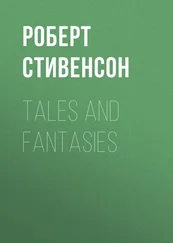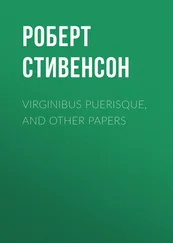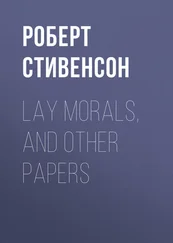Роберт Стивенсон - Familiar Studies of Men and Books
Здесь есть возможность читать онлайн «Роберт Стивенсон - Familiar Studies of Men and Books» — ознакомительный отрывок электронной книги совершенно бесплатно, а после прочтения отрывка купить полную версию. В некоторых случаях можно слушать аудио, скачать через торрент в формате fb2 и присутствует краткое содержание. Жанр: foreign_home, literature_19, на английском языке. Описание произведения, (предисловие) а так же отзывы посетителей доступны на портале библиотеки ЛибКат.
- Название:Familiar Studies of Men and Books
- Автор:
- Жанр:
- Год:неизвестен
- ISBN:нет данных
- Рейтинг книги:3 / 5. Голосов: 1
-
Избранное:Добавить в избранное
- Отзывы:
-
Ваша оценка:
- 60
- 1
- 2
- 3
- 4
- 5
Familiar Studies of Men and Books: краткое содержание, описание и аннотация
Предлагаем к чтению аннотацию, описание, краткое содержание или предисловие (зависит от того, что написал сам автор книги «Familiar Studies of Men and Books»). Если вы не нашли необходимую информацию о книге — напишите в комментариях, мы постараемся отыскать её.
Familiar Studies of Men and Books — читать онлайн ознакомительный отрывок
Ниже представлен текст книги, разбитый по страницам. Система сохранения места последней прочитанной страницы, позволяет с удобством читать онлайн бесплатно книгу «Familiar Studies of Men and Books», без необходимости каждый раз заново искать на чём Вы остановились. Поставьте закладку, и сможете в любой момент перейти на страницу, на которой закончили чтение.
Интервал:
Закладка:
On two most important points, Dr. Japp added to my knowledge, and with the same blow fairly demolished that part of my criticism. First, if Thoreau were content to dwell by Walden Pond, it was not merely with designs of self-improvement, but to serve mankind in the highest sense. Hither came the fleeing slave; thence was he despatched along the road to freedom. That shanty in the woods was a station in the great Underground Railroad; that adroit and philosophic solitary was an ardent worker, soul and body, in that so much more than honourable movement, which, if atonement were possible for nations, should have gone far to wipe away the guilt of slavery. But in history sin always meets with condign punishment; the generation passes, the offence remains, and the innocent must suffer. No underground railroad could atone for slavery, even as no bills in Parliament can redeem the ancient wrongs of Ireland. But here at least is a new light shed on the Walden episode.
Second, it appears, and the point is capital, that Thoreau was once fairly and manfully in love, and, with perhaps too much aping of the angel, relinquished the woman to his brother. Even though the brother were like to die of it, we have not yet heard the last opinion of the woman. But be that as it may, we have here the explanation of the “rarefied and freezing air” in which I complained that he had taught himself to breathe. Reading the man through the books, I took his professions in good faith. He made a dupe of me, even as he was seeking to make a dupe of himself, wresting philosophy to the needs of his own sorrow. But in the light of this new fact, those pages, seemingly so cold, are seen to be alive with feeling. What appeared to be a lack of interest in the philosopher turns out to have been a touching insincerity of the man to his own heart; and that fine-spun airy theory of friendship, so devoid, as I complained, of any quality of flesh and blood, a mere anodyne to lull his pains. The most temperate of living critics once marked a passage of my own with a cross and the words, “This seems nonsense.” It not only seemed; it was so. It was a private bravado of my own, which I had so often repeated to keep up my spirits, that I had grown at last wholly to believe it, and had ended by setting it down as a contribution to the theory of life. So with the more icy parts of this philosophy of Thoreau’s. He was affecting the Spartanism he had not; and the old sentimental wound still bled afresh, while he deceived himself with reasons.
Thoreau’s theory, in short, was one thing and himself another: of the first, the reader will find what I believe to be a pretty faithful statement and a fairly just criticism in the study; of the second he will find but a contorted shadow. So much of the man as fitted nicely with his doctrines, in the photographer’s phrase, came out. But that large part which lay outside and beyond, for which he had found or sought no formula, on which perhaps his philosophy even looked askance, is wanting in my study, as it was wanting in the guide I followed. In some ways a less serious writer, in all ways a nobler man, the true Thoreau still remains to be depicted.
Villon . – I am tempted to regret that I ever wrote on this subject, not merely because the paper strikes me as too picturesque by half, but because I regarded Villon as a bad fellow. Others still think well of him, and can find beautiful and human traits where I saw nothing but artistic evil; and by the principle of the art, those should have written of the man, and not I. Where you see no good, silence is the best. Though this penitence comes too late, it may be well, at least, to give it expression.
The spirit of Villon is still living in the literature of France. Fat Peg is oddly of a piece with the work of Zola, the Goncourts, and the infinitely greater Flaubert; and, while similar in ugliness, still surpasses them in native power. The old author, breaking with an éclat de voix , out of his tongue-tied century, has not yet been touched on his own ground, and still gives us the most vivid and shocking impression of reality. Even if that were not worth doing at all, it would be worth doing as well as he has done it; for the pleasure we take in the author’s skill repays us, or at least reconciles us to the baseness of his attitude. Fat Peg ( La Grosse Margot ) is typical of much; it is a piece of experience that has nowhere else been rendered into literature; and a kind of gratitude for the author’s plainness mingles, as we read, with the nausea proper to the business. I shall quote here a verse of an old students’ song, worth laying side by side with Villon’s startling ballade. This singer, also, had an unworthy mistress, but he did not choose to share the wages of dishonour; and it is thus, with both wit and pathos, that he laments her fall: —
Nunc plango florem
Ætatis teneræ
Nitidiorem
Veneris sidere:
Tunc columbinam
Mentis dulcedinem,
Nunc serpentinam
Amaritudinem.
Verbo rogantes
Removes ostio,
Munera dantes
Foves cubiculo,
Illos abire præcipis
A quibus nihil accipis,
Cæcos claudosque recipis,
Viros illustres decipis
Cum melle venenosa. 1 1 Gaudeamus : Carmina vagorum selecta . Leipsic. Trübner. 1879.
But our illustrious writer of ballades it was unnecessary to deceive; it was the flight of beauty alone, not that of honesty or honour, that he lamented in his song; and the nameless mediæval vagabond has the best of the comparison.
There is now a Villon Society in England; and Mr. John Payne has translated him entirely into English, a task of unusual difficulty. I regret to find that Mr. Payne and I are not always at one as to the author’s meaning; in such cases I am bound to suppose that he is in the right, although the weakness of the flesh withholds me from anything beyond a formal submission. He is now upon a larger venture, promising us at last that complete Arabian Nights to which we have all so long looked forward.
Charles of Orleans . – Perhaps I have done scanty justice to the charm of the old Duke’s verses, and certainly he is too much treated as a fool. The period is not sufficiently remembered. What that period was, to what a blank of imbecility the human mind had fallen, can only be known to those who have waded in the chronicles. Excepting Comines and La Salle and Villon, I have read no author who did not appal me by his torpor; and even the trial of Joan of Arc, conducted as it was by chosen clerks, bears witness to a dreary, sterile folly, – a twilight of the mind peopled with childish phantoms. In relation to his contemporaries, Charles seems quite a lively character.
It remains for me to acknowledge the kindness of Mr. Henry Pyne, who, immediately on the appearance of the study, sent me his edition of the Debate between the Heralds: a courtesy from the expert to the amateur only too uncommon in these days.
Knox . – Knox, the second in order of interest among the reformers, lies dead and buried in the works of the learned and unreadable M‘Crie. It remains for some one to break the tomb and bring him forth, alive again and breathing, in a human book. With the best intentions in the world, I have only added two more flagstones, ponderous like their predecessors, to the mass of obstruction that buries the reformer from the world; I have touched him in my turn with that “mace of death,” which Carlyle has attributed to Dryasdust; and my two dull papers are, in the matter of dulness, worthy additions to the labours of M‘Crie. Yet I believe they are worth reprinting in the interest of the next biographer of Knox. I trust his book may be a masterpiece; and I indulge the hope that my two studies may lend him a hint or perhaps spare him a delay in its composition.
Читать дальшеИнтервал:
Закладка:
Похожие книги на «Familiar Studies of Men and Books»
Представляем Вашему вниманию похожие книги на «Familiar Studies of Men and Books» списком для выбора. Мы отобрали схожую по названию и смыслу литературу в надежде предоставить читателям больше вариантов отыскать новые, интересные, ещё непрочитанные произведения.
Обсуждение, отзывы о книге «Familiar Studies of Men and Books» и просто собственные мнения читателей. Оставьте ваши комментарии, напишите, что Вы думаете о произведении, его смысле или главных героях. Укажите что конкретно понравилось, а что нет, и почему Вы так считаете.












